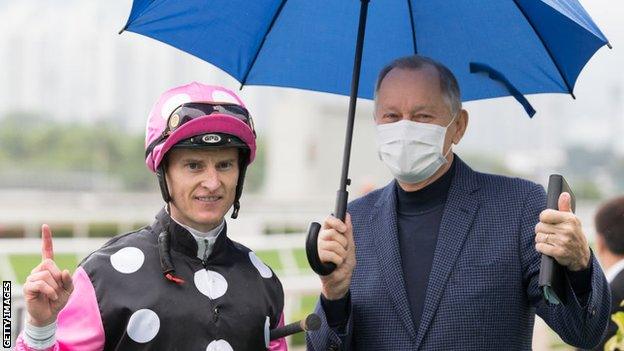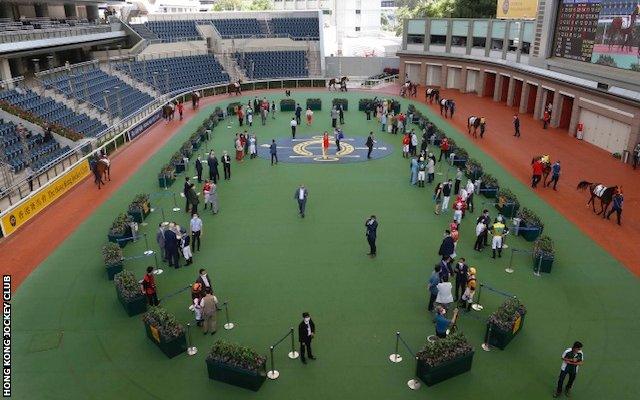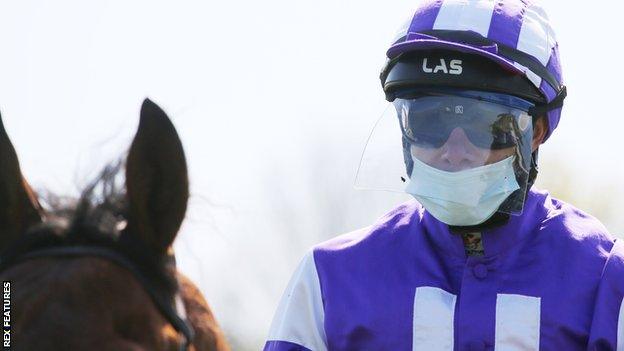Horse racing behind closed doors: How it works in Hong Kong and elsewhere
- Published

Jockey Zac Purton with trainer John Moore - riders in Hong Kong can remove face masks for races
"It's certainly a bit different."
Saliva swabs, temperature checks, face masks, jockey pods…
This is life in 2020 for leading rider Zac Purton - one of the most tested athletes in the world.
While elite sporting action has been suspended across the globe because of the coronavirus pandemic, horse racing has continued behind closed doors in places such as Australia, Hong Kong and the United States.
Where thousands of spectators once roared on the contenders, winners return in near-silence. Social distancing protocols are observed, safety is the watchword.
"You don't have the atmosphere. You notice there's no crowd," Purton tells BBC Sport in a break from the tussle with Joao Moreira to retain his champion jockey title in Hong Kong.
"It takes me back to the days when I was an apprentice riding in the country, setting off. It's a small price to pay so that racing can take place."

Social distancing and empty stands in the paddock at Sha Tin racecourse
There are two meetings a week - one at Happy Valley and the other at Sha Tin - and, while the numbers attending are restricted, it's still big business.
Betting, which provides a major income stream for racing alongside media rights, is at similar levels to last year as cash customers who previously used betting shops have switched online.
Sunday meetings at Sha Tin generate HK$1.4bn - about £150m.
In Purton's homeland Australia, the Victoria Racing Club says turnover from betting on horse racing is actually higher than before coronavirus, although its overall income is down.
"This has been driven by being the only sporting show in town with no other sport and limited international racing on offer," said a spokesperson.
More than 750 races have taken place behind closed doors, helping thousands of people who work in the racing industry.
"With over 110,000 people employed or participating in Victorian thoroughbred racing, the continuation of racing has been vital for many livelihoods," added the spokesperson.
"It has also ensured that our horses can continue receiving the daily care, attention and exercise they require."
Temperature checks are carried out at entrances - anyone clocking above 37.6C is barred.
Jockeys are split into 'green' and 'gold' teams. Their minimum riding weight has been raised slightly and they use multiple scales to limit interaction.
Different jurisdictions have slightly different rules.
The British Horseracing Authority is still liaising with government over its intended return on 1 June after more than two months away.
Irish racing chiefs have issued a 78-page document outlining protocols for its resumption a week later, with a deep clean of all racecourse premises ordered before and after every meeting,
No-one aged over 70 will be allowed at Irish tracks in the initial stages - ruling out the attendance of successful veteran trainers such as Jim Bolger, Jessica Harrington and Dermot Weld.
The showers and saunas for jockeys will be closed, as will catering facilities. Riders must bring their own pack lunches and screens will be erected to separate them from stewards before and after races.
In France, racing resumed on Monday. Access is restricted to two people per horse, and their names must be submitted 24 hours before the meeting.
The guidance from France Galop is clear. "During the day, everyone must demonstrate responsible behaviour," it says.
"Always keep a social distance of 1.5m between people. Never take off the facial mask. Respect the barrier gestures and use the hand sanitiser dispensers that have been put in place."

A jockey at Hanover in Germany, where racing resumed earlier this month
Back in Hong Kong, there have been just four confirmed coronavirus deaths from a population totalling 7.5 million.
Tentative steps are being taken by the Hong Kong Jockey Club to allow more people at racecourses.
"After several weeks with only racing participants, we had around 1,000 on Wednesday night - members, stewards and owners," says raceday operations manager Stephen Higgins, a former boss of Newbury and Wincanton racecourses in England.
"This will steadily increase in line with government advice - the latest being moving from containment to adaption. The level of case tracing here is world class.
"Racing has 1.5 million fans here so when we race, people stay home and watch. Government has supported this approach.
"It is important for the horses, but also for the wider community as the biggest charitable donor and tax payer in Hong Kong."
Purton has a friendly rivalry with 'Magic Man' Moreira - they sit next to each other in the changing room, albeit at the required distance of at least 1.5m apart.
The jockeys have saliva swabs four times a week. They must outline intended movements the day after a meeting on a form which is vetted by a biosecurity officer. They can't use external physios, trainers or gyms.
Riders live in the same block of accommodation, close to the track, and are now split into pods of five jockeys each at the track.
"It makes life pretty easy with the virus as we can remain in our own bubble," says three-time champion Purton, 37.
"We can still go to work every morning and we don't have to worry.
"If someone was to test positive, they would get taken out, as well as the other guys in their pod."
Purton spent a fortnight separated from his family earlier in the year - quarantine restrictions meant his wife and two children had to stay in a hotel after a return trip from Australia.
It is all a far cry from his victory on Little Bridge in front of packed stands in his only ride at Royal Ascot eight years ago.
Next month the Ascot meeting, famed for its glamour, is scheduled to go ahead without spectators.
"It will be strange but racing has been closed down for a while there and I'm sure people are itching to get back," he says.
"It gives people at home something to follow. I think mentally that helps everyone."